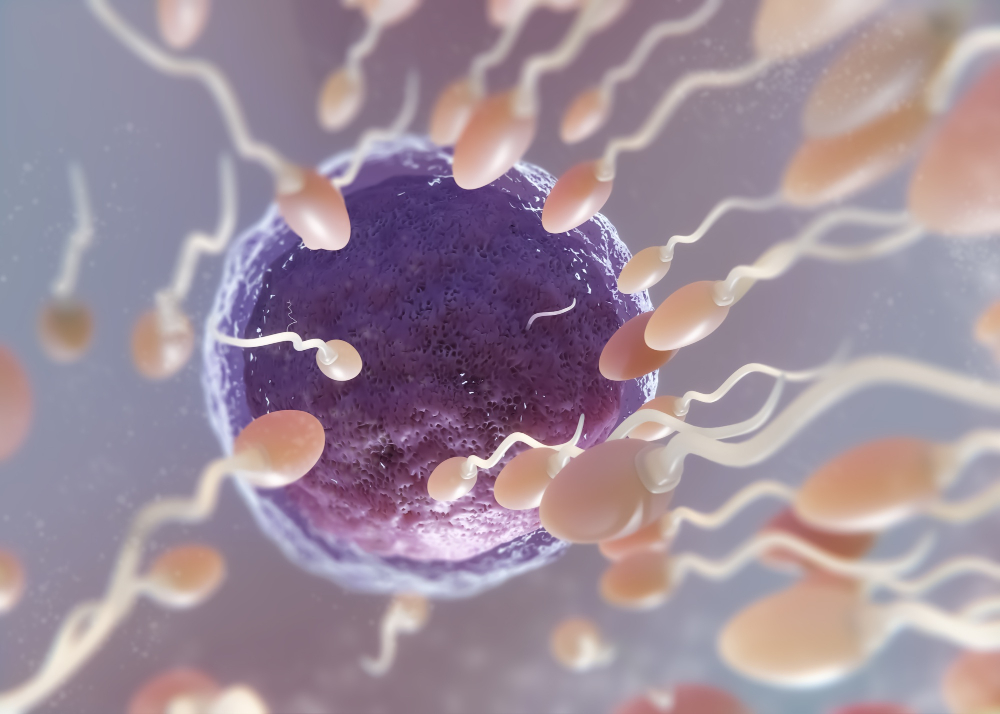Ever dreamt of fatherhood, picturing yourself building sandcastles with tiny footprints and cheering on your little slugger at a baseball game? But lately, the idea of expanding your family feels more like a strikeout than a home run. Maybe you’ve noticed a dip in your energy levels or whispers of “dad bod” following you around the gym. If you’re struggling with weight and starting a family, you’re not alone. Here’s the surprising truth: the impact of obesity on male fertility might be bigger than you think.
This article dives into the science behind obesity and male fertility, exploring how weight loss can become your secret weapon for boosting your chances of becoming a dad. We’ll uncover how excess weight can affect your hormones and sperm health, ultimately reducing your fertility potential. But fear not, future dads! We’ll also explore the positive impact weight loss can have and equip you with the knowledge to get back on track to fatherhood.
The Impact of Obesity on Male Fertility and Hormones
Building a family is an exciting time, but hitting a roadblock can be frustrating. If you’re struggling with weight and starting a family, you might be surprised to learn that those extra pounds could be affecting your fertility in a hidden way. Here’s the science behind it: obesity can significantly impact your male hormones, throwing a curveball at your sperm production and overall fertility potential.
The key player here is testosterone. This hormone is like the MVP of male health, influencing everything from muscle mass and bone density to sex drive and sperm production. Unfortunately, excess body fat disrupts the production of testosterone, leading to lower levels. Think of it like a clogged pipe – the more fat tissue you have, the less testosterone can flow freely.
Lower testosterone levels can have a domino effect on your fertility. Testosterone is crucial for sperm development and maturation within the testes. When testosterone production dips, sperm production can slow down, leading to a lower sperm count. Additionally, testosterone helps sperm develop a healthy shape and motility (movement). Without enough testosterone, sperm might struggle to reach and fertilize an egg, impacting your chances of conception.
But that’s not all. Obesity can also lead to increased levels of estrogen, the primary female sex hormone, in men. This hormonal imbalance further disrupts the delicate balance needed for healthy sperm production.
How Obesity Affects Sperm Quality and Production

We saw how obesity throws a curveball at your hormones, but the impact goes beyond just testosterone. Now, let’s look at how those extra pounds can directly affect the quality and production of your sperm, the all-stars of fertilization.
Sperm Count: The number of sperm you produce plays a significant role in your fertility. Studies show that obesity is linked to a lower sperm count. Imagine a baseball stadium with fewer players on the field – the fewer sperm you have, the less likely it is for one to reach the egg and achieve fertilization.
Sperm Morphology: Think of sperm morphology as the shape of your sperm. Healthy sperm have a specific, streamlined shape that allows them to swim efficiently and reach the egg. Unfortunately, obesity can negatively impact sperm morphology, leading to abnormally shaped sperm. These misshapen sperm have a tougher time navigating the journey to the egg, reducing your chances of conception.
Sperm Motility: Picture sperm as tiny swimmers racing towards the egg. Motility refers to their ability to move effectively. Obesity can impair sperm motility, making it harder for them to reach their target. Imagine the swimmers getting tired or losing their way – the weaker their movement, the less likely they are to successfully fertilize the egg.
Increased Health Risks and Fertility
While understanding the direct impact of obesity on sperm is crucial, it’s important to consider the bigger picture. Obesity can create a domino effect, leading to other health conditions that can further hinder your fertility journey. Here are some ways obesity can increase health risks and indirectly affect your chances of becoming a dad:
- Erectile Dysfunction (ED): Achieving and maintaining an erection is essential for successful conception. Obesity is a major risk factor for ED. Remember the hormonal imbalance we discussed earlier? Low testosterone levels and circulatory issues associated with obesity can make it difficult to get or keep an erection.
- Type 2 Diabetes: Obesity significantly increases the risk of developing Type 2 Diabetes. This chronic condition can damage nerves and blood vessels throughout the body, including those in the genital area. This damage can further contribute to ED and affect overall sexual health.
- Sleep Apnea: This condition, where breathing repeatedly stops and starts during sleep, is more common in men with obesity. Disrupted sleep quality caused by sleep apnea can affect hormone regulation, including testosterone production. Reduced testosterone, as we discussed, can then impact sperm health and fertility.
Remember: These health risks are not only detrimental to your fertility but can also affect your overall well-being. In the next section, we’ll turn the tables and explore the positive impact weight loss can have on your health and your chances of becoming a dad.
The Positive Impact of Weight Loss
Here’s the good news: the impact of obesity on male fertility is not a one-way street! Taking control of your weight through healthy weight loss can significantly improve your chances of becoming a dad. Here’s how:
Boosting Testosterone: Remember how excess body fat disrupts testosterone production? Well, weight loss can be like hitting the reset button. Studies show that even moderate weight loss can lead to a significant increase in testosterone levels. This hormonal boost can improve sperm production and overall sperm health.
Supercharging Sperm: Weight loss isn’t just about quantity, it’s about quality too! Losing weight can positively impact sperm quality by improving sperm morphology and motility. Think of it like training your sperm team – they become stronger swimmers with a better chance of reaching the egg.
Overall Health Benefits: Weight loss goes beyond just improving fertility. By shedding pounds, you’ll be reducing your risk of developing health conditions like type 2 diabetes and sleep apnea, which can indirectly affect your fertility journey. Additionally, increased energy levels and improved overall well-being can make the journey to fatherhood feel less like a marathon and more like a brisk walk in the park.
Taking Charge of Your Health: The best part? Weight loss is an achievable goal you can control. By making healthy changes to your diet and incorporating regular exercise, you can create a positive impact on your fertility and overall health.
How to Lose Weight in a Safe Way
We’ve explored how weight loss can significantly improve your fertility. Now, let’s delve into how you can achieve that goal. There are two main approaches to consider: traditional weight loss methods and bariatric surgery.
Traditional Weight Loss Methods
These include making healthy changes to your diet and incorporating regular exercise into your routine. This might involve:
- Diet: Focus on a balanced diet rich in fruits, vegetables, whole grains, and lean protein. Reduce intake of processed foods, sugary drinks, and unhealthy fats.
- Exercise: Aim for at least 150 minutes of moderate-intensity exercise or 75 minutes of vigorous-intensity exercise per week. Strength training is also beneficial for overall health.
These methods are a great starting point for many men and can lead to significant weight loss and improved fertility.
Bariatric Surgery: A Safe Option for Some
For men with severe obesity (morbid obesity, with a BMI exceeding 40), achieving healthy weight loss through traditional methods alone might be challenging. In these cases, bariatric surgery can be a safe and effective option to consider, but only after a thorough discussion with a doctor specializing in weight loss surgery, like Dr Ahmad Shabana. Here’s what you need to know:
- What it is: Bariatric surgery is a major medical intervention that involves procedures like gastric bypass or sleeve gastrectomy to modify the stomach or intestines, leading to weight loss.
- Benefits for Fertility: Studies suggest that bariatric surgery, particularly the sleeve gastrectomy procedure, can lead to significant weight loss and improve male fertility in some cases. This improvement might be due to the positive effects on hormone levels and sperm health discussed earlier.
- Safety and Commitment: Bariatric surgery is a safe and well-established procedure when performed by a qualified surgeon. However, it requires a strong commitment from the patient. Successful long-term weight loss depends on following strict dietary and lifestyle changes post-surgery.
Consulting a Doctor is Crucial
Whether you choose traditional weight loss methods or explore bariatric surgery as an option, consulting a doctor specializing in weight loss management is crucial. You can contact our medical team for assistance. They can:
- Assess your individual situation: They’ll evaluate your overall health, weight loss history, and specific needs.
- Develop a personalized plan: They’ll work with you to create a safe and effective weight loss plan tailored to your circumstances.
- Discuss bariatric surgery: If you qualify and it’s deemed suitable for your needs, they can answer all your questions about bariatric procedures and guide you through the process.
Remember, the best approach to weight loss is the one you can adhere to consistently. Traditional methods offer a sustainable solution for many men. However, for those with severe obesity struggling to lose weight through traditional methods, bariatric surgery can be a safe and life-changing option, potentially improving both their overall health and fertility prospects.

